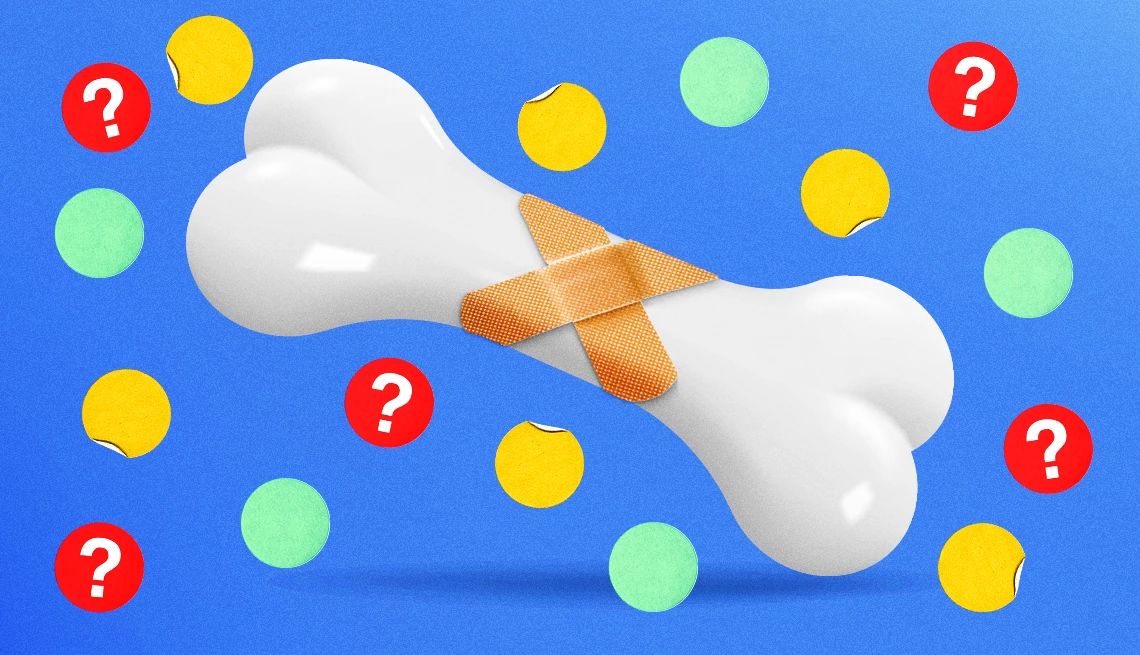
Take Our Bone Health Quiz, Then Take Action
- Select a language for the TTS:
- UK English Female
- UK English Male
- US English Female
- US English Male
- Australian Female
- Australian Male
- Language selected: (auto detect) - EN
Play all audios:

AARP (Getty Images; Shutterstock) Facebook Twitter LinkedIn
This quiz was created with the assistance of generative AI. It was reviewed by editors before publication.
As we get older, our bones begin to lose strength and density. However, there are steps you can take — diet, exercise, medications and more — to keep your bones healthy and strong as you
age. You can learn these tips, tricks and advice in AARP’s Smart Guide to Bone Health. After you’ve read that, take this quiz to test your knowledge of what you’ve learned.
Question 1 of 10
What is the recommended daily calcium intake for women over 50, according to our recent Members Edition Smart Guide to bone health?
800 mg 1,000 mg 1,200 mg 1,500 mgThe National Institutes of Health (NIH) recommends 1,200 mg of calcium per day for women over the age of 50 (and everyone over 70) to help maintain strong bones and prevent osteoporosis. For
men ages 51-70, the goal is 1,000 mg a day of calcium. All age groups can reach those totals through a combination of diet and supplements.
Question 2 of 10Which of the following is NOT a recommended source of calcium?
Leafy greens Fortified plant-based milk Meats YogurtWhile meat and poultry contain some calcium, they are not considered major sources of the nutrient. The best sources of calcium include dairy products (like yogurt), leafy greens, fortified
foods (like plant-based milk) and nuts. However, the protein in meat does provide amino acids that play a key role in building bone tissue and boosting calcium absorption, so make sure
you’re getting enough protein in your diet.
Question 3 of 10Which type of calcium supplement is recommended for those who experience nausea, bloating or constipation with calcium carbonate?
Calcium phosphate Calcium citrate Calcium lactateCalcium gluconate
Calcium citrate is easier on the stomach and more easily absorbed compared to calcium carbonate. And because it does not require an acidic stomach environment, it’s also a better choice for
individuals on acid-reducing medications.
Question 4 of 10Calcium is best absorbed in single doses no greater than what amount?
1,000 mg 1,200 mg 500 mg 700 mgThe NIH states that calcium is best absorbed in doses of 500 mg or less. To optimize absorption, it’s recommended that you stagger your calcium intake throughout the day. For example, you
could have yogurt at breakfast, snack on almonds at lunch, and add leafy greens like spinach or kale to dinner. If you take a supplement, opt for a smaller dosage and take two pills at
different times of day.
Question 5 of 10Which type of exercise is most effective for strengthening bones?
Swimming Weight-bearing exercises Cycling RowingWeight-bearing exercises, such as walking, dancing and gardening, are the most effective for stimulating bone growth because they involve fighting gravity, which helps build bone density.
Unlock Access to AARP Members Edition
Join AARP to Continue Already a Member? Login
Members only
